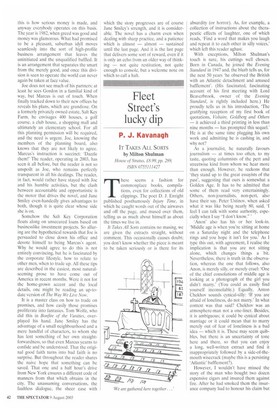Fleet Street's lucky dip
P. J. Kavanagh
IT TAKES ALL SORTS by Milton Shulman House of Stratus, £8.99, pp. 289, ISBN 0755111427 There seems a fashion for commonplace books, compilations, even for collections of old clippings. The poet D. J. Enright published posthumously Injury Time, in which he caught words out of the airwaves and off the page, and mused over them, telling us as much about himself as about the times we live in.
It Takes All Sorts contains no musing, we are given the extracts straight, without comment. This occasionally causes doubt; you don't know whether the piece is meant to be taken seriously or is there for its absurdity absurdity (or horror). As, for example, a collection of instructions about the therapeutic effects of laughter, one of which reads, 'Find a word that makes you laugh and repeat it to each other in silly voices,' which left this reader aghast.
With exceptions, Milton •Shulman's touch is sure, his cuttings well chosen. Born in Canada, he joined the Evening Standard in 1947 and, the blurb tells us, for the next 50 years 'he observed the British with an Atlantic detachment and amused bafflement'. (His fascinated, fascinating account of his first meeting with Lord Beaverbrook, owner of the Evening Standard, is rightly included here.) He proudly tells us in his introduction, 'The gratifying reception of my first book of quotations, Voltaire, Goldberg and Others — it achieved a third printing in less than nine months — has prompted this sequel.' He is at the same time plugging his own work and admitting he is cashing in, and why not?
As a journalist, he naturally favours journalism — at times too often, to my taste, quoting columnists of the pert and streetwise kind from whom we hear more than enough. However, he reckons that 'they stand up to the great essayists of the past', suggesting that ours is somewhat a Golden Age. It has to be admitted that some of them read very entertainingly. Others, non-journalists, non-pert, also have their say. Peter Ustinov, when asked what it was like being nearly 80, said, 'I feel I can talk with some authority, especially when I say "I don't know." ' 'Anon' also has his or her look-in. 'Middle age is when you're sitting at home on a Saturday night and the telephone rings and you hope it isn't for you.' As I type this out, with agreement, I realise the implication is that you are not sitting alone, which changes things a bit. Nevertheless, there is truth in the observation, whereas the one that follows, also Anon, is merely silly, or merely cruel: 'One of the chief consolations of middle age is looking at a photograph of the girl you didn't marry.' (You could as easily find yourself inconsolable.) Equally, Anton Chekhov sounds cynical-silly: 'If you are afraid of loneliness, do not marry.' In what context was that said? Chekhov was an atmosphere-man not a one-liner. Besides, it is ambiguous; it could be cynical about marriage or it could mean that to marry merely out of fear of loneliness is a bad
idea which it is. These may seem quibbles, but there is an uncertainty of tone here and there, so that you can enjoy a long, well-written extract and find it inappropriately followed by a side-of-themouth wisecrack (maybe this is a persisting 'Atlantic' bafflement?).
However, I wouldn't have missed the story of the man who bought two dozen expensive cigars and insured them against fire. After he had smoked them the insurance company had to honour his claim but sued on 24 charges of arson. He got two years.
Milton Shulman's aim is 'to save them from the shredder or some remote mausoleum for dead newspapers and quite right too. For years the brighter spirits have gone into journalism rather than politics (alas for us). They deserve their own Hansard and this is a form of it, a readable chronicle of our time.



































































 Previous page
Previous page